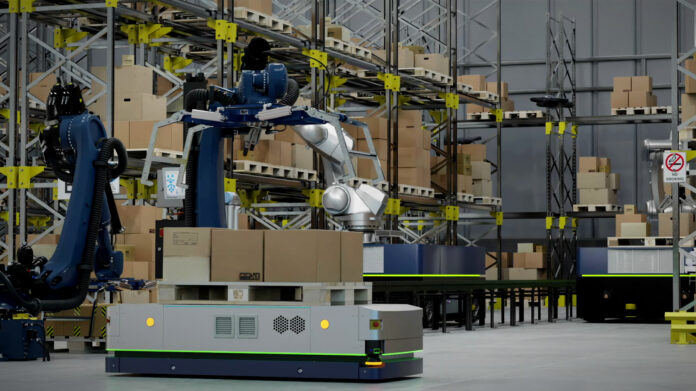Interesting announcement across the RCR news desk: Finnish firm Cumucore and Austrian outfit Kontron, both private 5G vendors, have combined to deliver time-sensitive networking (TSN) capabilities on a private 5G setup for Industry 4.0 customers. TSN is an Ethernet-based functionality, which enables synchronised comms between machines, robots, and sensors. It is part of the 5G roadmap, too, first specified in Release 16 of the 5G NR standard, and further enhanced in Releases 17 and 18. It remains an iconic – albeit rather niche perhaps – capability for private 5G vendors to support the high-end Industry 4.0 apps to drive automation and efficiency in production sites.
Autonomous mobile robots and guided vehicles (AMRs and AGVs), positioned as headline use cases for private 5G, also benefit from TSN to manage their precise and safe navigation. Cumucore makes private 5G core networks, and has developed a set of 5G-based ‘TSN modules’ to deliver accurate time synchronisation on 5G – and to liberate TSN as a tethered technology. IoT specialist Kontron, which makes both core and radio elements in private 5G systems, and which picked up the automotive assets of US IoT module maker Telit Cinterion last August, has helped with the integration work, at least, to integrate TSN functions into the 5G core network from Cumucore. Kontron was in the news last month with a private 5G deployment at a German university.
Intel is also involved. TSN is a collection of IEEE 802.1 standards for Ethernet comms, formally, defining mechanisms for deterministic networking over cabled links. It guarantees packet transport with bounded latency, low packet delay variation, and extremely low packet loss. But wired connections restrict mobility, running a ‘tail’ behind machines and devices, and stopping free movement and flexibility in production. Meanwhile, the listen-before-talk mechanism in Wi-Fi radios, causing delays between transmissions, precludes TSN on the grounds of reliability.
“Ethernet ensures precise timing but limits mobility, while Wi-Fi lacks determinism,” said Cumucore. But private 5G presents a goldilocks opportunity to deliver ultra-reliable wireless TSN for Industry 4.0. “Private 5G bridges the gap – offering ultra-low latency, high reliability, and real-time synchronization essential for Industry 4.0,” it added. The Cumucore solution incorporates a network-side TSN translator (NW-TT) in the user-plan function and a device-side TSN translator (DS-TT) in the user equipment.
Cumucore said: “The first results of the offset between the Grand Master in the fixed network and the clock in the mobile device of 41μs (ms)… But Cumucore continues to develop 5G core modules to reach the 900ns (0.9ms) required for reliable TSN.” As such, it sounds like an Ethernet-equivalent wireless TSN solution is not up-to-speed quite yet (see image). At the same time, Cumucore called it a “worldwide first”, a “first deployment” to show sub-50 microsecond (ms) time synchronisation, and a “new era of 5G for industrial and manufacturing sectors”.

It explained: “In Industry 4.0, people, machines, and devices have to communicate with each other in real time. This makes connectivity, or the ‘industrial internet’, the very essence of Industry 4.0. The industrial environment sets strict requirements in terms of low latency, high throughput, maximum service availability, security, and reliability… A key requirement is data delivery with deterministic latency and high reliability, TSN… provides such determinism. It guarantees that data reaches its destination fast (often in milliseconds) and at the right time, synced across devices.”
It added: “This advanced system seamlessly bridges the gap between traditional fixed networks and wireless technologies… The result is a solution offering deterministic communication with unparalleled reliability, ultra-low latency, and guaranteed quality-of-service (QoS) – all critical for digitalized industrial operations… By enabling TSN over 5G and adopting mobile network-first principles, industries [can] achieve greater efficiency, flexibility, and sustainability.”

